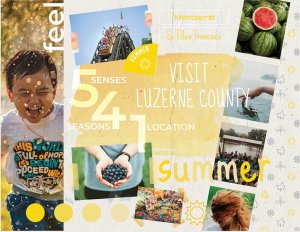How Destinations Can Champion Community-Based Tourism with Their Partners
March 31, 2025
Destination marketing is more than splashy ad campaigns, packed media plans, or glossy visitor guides—it’s about collaboration. When hotels, attractions, and local businesses actively participate in marketing efforts, they don’t just promote themselves—they amplify the destination’s reach and impact. A DMO’s job isn’t just to tell the story—it’s to help partners become part of it, creating a stronger, more connected tourism ecosystem that benefits everyone.
“Tourism isn’t just about bringing people in—it’s about building something lasting for the people who are already here,” said Daryl Whitworth, Vice President of Destination Strategy. “When we support our partners with the right tools and strategies, we’re helping shape stronger communities.”
Boosting Visibility: SEO for Hotels & SEM for Hotels
Hotels and other forms of lodging are at the core of every destination’s economy. The right ad for a hotel or vacation rental, spotted and the right time during the travel booking process, can easily extend the visitor’s length of stay and increase the economic revenue for the destination.
Co-op SEO and SEM for hotels, as well as other tourism businesses, managed by the DMO, can offer these tourism partners a cost-effective way to expand their reach and increase visibility by pooling resources for shared campaigns. These programs allow hotels to participate in joint SEO for hotels and SEM for hotels efforts—helping them maximize their exposure without bearing the full financial burden of an independent campaign.
When a DMO leads a co-op, they ensure destination branding stays consistent and recognizable, increasing overall awareness—while still giving hotels full control over their own ads, messaging, and direct booking links. DMOs can also provide guidance to local partners that might not have in-house marketing expertise, sharing marketing best practices to help boost hospitality companies.
“Co-ops are about making sure every partner, big or small, gets a seat at the table and real results from their investment,” said Ronda Thiem, Senior Vice President of Business Development. “And more importantly, the overall messaging is supported by the sponsor in a coordinating and complementary way.”
In a typical SEO for hotels or SEM for hotels co-op program, businesses opt into customizable marketing opportunities that align with their goals, whether it’s driving direct bookings, promoting seasonal events, or increasing brand awareness. Participants may contribute funding and creative assets while the organizing DMO or its marketing agency handles campaign execution, performance tracking, and strategic optimization. By combining marketing power, these programs generate stronger results, stretch marketing dollars further, and create a unified brand presence that benefits the entire tourism ecosystem.
Madden recently teamed up with the West Virginia Tourism Office to support its partners across the state with SEO and SEM co-op programs. On the SEM side, custom keywords, headlines, and ad groups for each partner are created and timed to spark interest during high-travel seasons and key planning windows. For the SEO program, partner websites are fine-tuned and partners are provided with monthly performance insights and ongoing recommendations to help each site rank better and drive more traffic.
In andother example of co-ops in action, Traverse City Tourism joined forces with other Michigan brands to amplify marketing spend. One of these collaborations was with its local airport, Cherry Capital airport, to run strategically timed campaigns to drive visitation from major direct-flight markets like Dallas, Houston, and Philadelphia. Another was a Discover Northern Michigan co-op that brought together other destinations like Gaylord, Charlevoix, and Mackinac Island to spotlight freshwater escapes and outdoor thrills. Campaigns targeted East Coast cities like Boston and D.C., inspiring travelers to kick off their adventures in Traverse City and explore the magic beyond.
Community-Based Tourism: Fueling the Businesses That Make a Place Special
Just like with SEO or SEM co-op programs, DMOs can take the lead in community-based tourism by developing initiatives that inspire visitors to connect with local businesses, artisans, and cultural experiences. For instance, when Destination Door County wanted to encourage visitors to explore local restaurants they launched the “Savor the Flavor of Door County” program. The campaign motivated visitors to dine at local restaurants, snap a photo of their meal, and share it on Instagram for a chance to win a gift certificate.
Paid advertising drove people to pick up or download a guide featuring the best restaurants in the area, creating a seamless connection between print, social media, and digital marketing—boosting engagement, increasing campaign participation, and driving traffic to local businesses. These community-based tourism efforts, working hand-in-hand with restaurants, hotels, and attractions to connect travelers with authentic, locally-driven experiences, keep tourism dollars circulating where they matter most—within the community.
Sharing Data & Insights to Strengthen Partners
DMOs have access to powerful data that can help hotels and tourism businesses make smarter decisions. By providing insights into visitor demographics, booking trends, and traveler behavior, DMOs can equip partners with the tools they need to optimize marketing strategies, adjust pricing, and create more effective campaigns.
Beyond just sharing reports, DMOs can play a proactive role in educating their partners on how to leverage this data effectively, as well as equip them with the latest marketing insights. Offering this information through workshops, lunch and learn programs, or direct collaboration equips tourism partners with practical marketing skills, insider tips, and hands-on strategies they can use to grow their business.
Not only does this collaboration strengthen the visibility of the destination as a whole, but it also positions the DMO as an indispensable resource for its tourism partners—one that invests in their success, fosters collaboration, and ensures the entire tourism ecosystem thrives. Whether it’s understanding the latest tactics for SEO for hotels, optimizing paid media efforts for small businesses, or learning how to craft compelling social content, these educational opportunities empower tourism partners to take control of their marketing, maximize their visibility, and drive more engagement and revenue.
Recently Visit Bentonville brought in Madden’s SEO experts to host a SEO/GEO workshop for their partners, teaching them how to optimize their websites for search and location-based marketing. These kinds of initiatives help local businesses increase visibility, attract the right audiences, and ultimately contribute to the overall success of the destination.
We have also held AI workshops for community partners of our DMO clients, teaching the basics of AI for marketing and focusing on practical principles and resources. In a recent workshop for Table Rock Lake, we presented to their Chamber of Commerce members and covered the fundamental concepts and benefits, highlighted the most relevant principles for small business owners. provided essential tools and resources to get started, showed how AI can be applied in various aspects of a business, and demonstrated how to use AI to overcome challenges.
Connecting Culture and Tourism for a More Authentic Experience
A destination’s culture is its heartbeat, and DMOs are in a unique position to ensure that culture and tourism complement each other in meaningful ways. According to a report by Booking.com, 75% of survey participants said that when they travel they want, “authentic experiences that are representative of the local culture.”
By forging partnerships between hotels, restaurants, attractions, and local cultural educators, artists, and chefs, DMOs can create immersive experiences that don’t just showcase a place’s identity — they make visitors feel it. These authentic connections turn one-time trips into unforgettable experiences, inspiring travelers to go beyond booking a trip to becoming lifelong advocates for the destination. They return, they share their experiences with others — creating a ripple effect that strengthens the entire tourism ecosystem. By integrating culture and tourism into marketing strategies, DMOs can ensure that visitors not only see a place but truly experience its essence.
Collaboration is the Key to Destination Success
A successful destination isn’t built in silos—it’s built through partnerships, collaboration, and shared success. When DMOs take an active role in supporting hotels and tourism partners, through education, information sharing, and partnerships, they create a more sustainable, resilient, and profitable tourism ecosystem. Whether through SEO for hotels, SEM campaigns, community-based tourism initiatives, or cultural collaborations, DMOs that empower their partners aren’t just marketing a place—they’re building a destination people want to visit, return to, and talk about.



